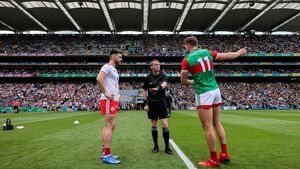Lack of respect for refs is a stain on the GAA

Tyrone's Padraig Hamspey and Mayo's Aidan O'Shea at the coin toss with referee Joe McQuillan ahead of the 2021 All-Ireland SFC final. Picture: INPHO/James Crombie
Ah ref. No, not that one. The real ones. The referee fraternity, the poor relation of the GAA, the carry-over from our colonial past when getting the better of John Bull was the only game in town. The GAA, especially football, is a reflection of us Gaels as a people; passionate, wild, intense, pushing the boundary out, bending legality, an Irish solution to an Irish game. All crammed into seventy minutes of mayhem, madness and excitement. Maybe it was a game never meant to be refereed?
However, it has a referee and the problem is we never really grappled with the concept. The laws, to this day, are wide open to interpretation. One man’s free in is another’s free out, often accepted unquestioned by the crowds. You hope the referee will even it up over the match. The ‘good’ ref lets the match ‘flow’. The ‘bad’ ref is whistle-happy. The problem arises when letting it ‘flow’ descends into chaos a la the 1996 All-Ireland final. One side happy, the other sad. The ref never wins.
This is a topic that could drift away from me. Do I dwell on the, in my opinion, awful decisions that have been given against us? Do I try and right perceived wrongs and rewrite history? No. I’m trying to steer a fair course here. What we know is this: GAA matches potentially are the most supervised games that exist. Leaving out VAR in elite soccer, we have one referee and two assistants in rugby, likewise soccer. The GAA has a referee, two assistant referees and four umpires. One would think sufficiently empowered, they would have a solid grasp on the game. However, responsibility rests mainly with the man in the middle.
How many times have you seen the thousand-yard stare on a linesman as he looks away whilst your half-forward has the kidneys battered out of him? Umpires who look at each other at the first sight of a disputed score or incident? I don’t blame them, the powers they possess are dependent on the referees take on what they saw or didn’t see. In other words, they don’t have the final call. Essentially the game itself has been set up without a clearly defined tackle. Rugby is clear as day as what defines as a legal tackle, so is soccer. Yes, we get decisions wrong there but generally most are right. Gaelic football carries within its remit a bucket of grey.
Armagh in 2002 upped the intensity of the modern game tackle. In 2003, Tyrone took it to a different level and it’s there I lay the blame for what passes as the modern-day tackle. A player in possession was now surrounded by at least three tacklers, choreographed arms outstretched, inch apart but choking the man in possession. At its peak in execution, the possessor cannot even drop the ball to ensure he’s not blown for over-carrying. I’m in a minority here but to me the ‘choke’ tackle in Gaelic is fundamentally illegal because a play cannot ensue. Man on man is fine. Three surrounding and eating the space up is a foul. In my opinion.
Alas, my opinion doesn’t count. So, the better, fitter counties today have that tackle as part of their armoury. That has led to a possession lateral-passing game, chances at a premium, set plays the order. But the old game was never designed to be an Aussie Rules-rugby-basketball hybrid. A chest fetch is rewarded with a mark, caught in the mixer of a three-man tackle is a free against you. Enter Sandman, the referee, who has to arbitrate on what’s a fair shoulder charge, fetch or tackle. In a game with no clear enforceable clearly acceptable tackle. In allowing subjective officiating as opposed to objective officiating, the referee cannot win.
No referee, no match. And yet, we see them undermined time and time again by the labyrinthine GAA disciplinary process, too many to enumerate here. A ripe field for the amateur legal whiz and more so, legal whiz today. Referee sends lad off, cue an appeal straight away. These are some of the appeals bodies that exist: the CCC, Hearings Committee, the Appeals Committee and finally, the DRA. The latter eventually saw Dublin player Connolly cleared some years ago. To some that decision defied sense, to others it was sense. To the majority, it made a travesty of the disciplinary process. I can only imagine what the referee made of it.
No other sport seems to suffer this extraordinarily generous appeals system, designed almost to ensure no player is actually suspended. Waterford’s John Mullane stands like a beacon in accepting his punishment back in 2004 – no appeal when most other counties would have burned the law book to get him off. Was it Tyrone and Armagh a number of years ago that had four players sent off, my recollection is that appeals saw all cleared. Why bother with a referee? There seems an almost psychotic reflex with the GAA body that yes, we want regulation, arbitration on the field, but then we will move Croagh Patrick to clear the offender. They don’t appear to be able to marry the process. The process being that the referee is part of the game, not an outlier there to ensure the game goes ahead. Either they are backed or not.
This may seem controversial but I believe there is an element of cowardice amongst the playing fraternity. Very few graduate on to officiating when they retire. A few will go down the road of boardroom intrigue, training, coaching and managing. But not officiating. That wasn’t always the way. Cavan’s Simon Deignan won an All-Ireland against Mayo in 1948 and refereed the 1950 All-Ireland final won by Mayo against Louth. He was to referee other finals too. Meath’s Peter McDermott won as a player the 1949 All-Ireland final but refereed the 1953 and ’56 finals, Laois Boy Wonder Bill Delaney refereed the ’57 final and our own Doc Loftus, winner in 1951, refereed the 1965 and ’68 finals. That wouldn’t happen today. It’s as if we see referees as a separate caste and not really part of the GAA family, the old landlord’s water bailiff or gamekeeper, part of the establishment that keeps Paddy in place.
So whilst players, managers and coaches play free and easy with the rules, interpret the game as the laws allow them, the referee is caught in the aftermath where a poor decision, a contentious decision, puts them into the quasi legal process. Whilst it’s a free shot for the player and club or county concerned, it has serious personal ramifications for the referee’s integrity. As one who has sat in various courts in another world where your only reply acceptable is a ‘yes’ or ‘no’ but with the opposition given free rein, a referee is held to a standard no one else in the game is held to.
Wash the hands and musha what can we do this time? Plenty actually. Enforce every club affiliated in each county to provide a fully certified Grade ‘A’ referee for that county’s club championships otherwise they cannot enter. Enforce every county to provide two Grade ‘A’ referees to officiate at National League or Championship level. Likewise, no referee, no entry. The GPA to encourage their players to get involved, they cannot have it every way. Headquarters to announce that unless mistaken identity is at stake, no appeals will be heard regarding any referee’s decision. It’s final. End of. Anyone dissenting aren’t allowed in. Get the legalise out of the game. It’s sport, not the Four Gold Mines.
A player can miss an open goal, a goalkeeper let a dribbler between his legs, a manager get his tactics totally wrong, but when the final whistle goes it’s generally consigned to the pitch and left there to be buried. A referee may walk off the pitch and his work may be about to gather pace where he has to, like a criminal almost, account for his decisions, calls and outcomes. That’s not GAA. That’s coursing. A different sport altogether.




